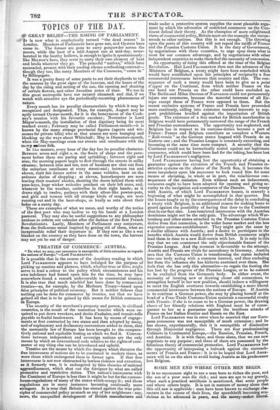TOPICS OF THE DAY.
flik GREAT RELIEF—THE RISING OF PARLIAMENT. IrIT is now what is emphatically termed "the dead season" in London. Members of Parliament have gone out, and Oysters have come in. The former are gone to carry gunpowder across the moors, while the heat of a mid-August sun at mid-day, rever- berated in the heathy hollows, is enough to ignite it spontaneously : like MIXON'S hero, they seem to carry their own element of heat and broils wherever they go. The peaceful "natives," which have succeeded, present with their cooling silence a refreshing contrast— though they too, like many Members of the Commons, "come in" by Billingsgate. It was a pretty fancy of some poets to set their shepherds to tell the seasons by the great signs of the heavens, and the hours of the day by the rising and setting of the sun, the opening and shutting of certain flowers, and other Arcadian notes of time. We too in this great metropolis have our natural almanack and dial, if we watch with attentive eye the periodically-recurring phaenomena of nature.
Every month has its peculiar characteristic by which it may be recognized and designated. Thus, for example, August may be aptly termed Oyster-month, for it is the honeymoon of the Cock- ney's reunion with his favourite esculent; November is Lord Mayor's-month, the installation of that dignitary being its most marked event ; February may be called Parliament-month—it is known by the many strange provincial figures (agents and wit- nesses for private bills) who at that season are seen lounging and blocking up the ways about Whitehall ; May is Dissenters-month, when the May-meetings cram our streets and omnibuses with the merry serious folk. In like manner, every hour of the day has its peculiar character.
Between seven and eight a. at. the floors of shops and the pave- ment before them are paring and sprinkling ; between eight and nine, the morning papers begin to flow through the streets in milky streams ; between nine and ten, men of business are shot out from the suburban omnibuses at every street-end ; between ten and eleven, their fair dames arrive in the same vehicles, bent on the arduous duties of shopping ; at eleven, housekeepers are seen leaving their masters' abodes' shutting the doors behind them with pass-keys, huge wicker reticules pendant on their left arms, and, whatever be the weather, umbrellas in their right hands; as it draws nigh to twelve, potboys with their silver-like pewter-pots, and girls and women with all strange kinds of mugs are seen running out and in the beer-shops, as busily as ants ;bout their holes on a sunny day.
These are examples of what we mean, and worthy of the notice of the first poet who may incline to try his hands at a London pastoral. They may also be useful suggestions to any philosopher anxious to reform our calendar after the fashion of the first French Revolutionists. Lastly, Members of Parliament may conjecture, from the frolicsome mood inspired by getting rid of them, what an i inexpressible relief their departure s. If they seat as like a wet blanket on the country as they have done on the town, the harvest may not yet be out of danger.


























 Previous page
Previous page